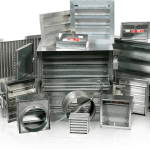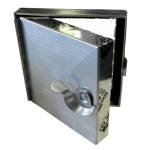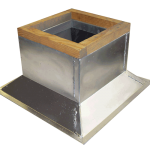
What’s better than saving money? We’ll answer for you: protecting the environment at the same time with an Energy Star rating. There’s no doubt that as technology has increased, so has our understanding of the impact our habits have on the world around us. One of the main ways companies are working to protect the climate is through encouraging energy-efficient programs and services, such as the ENERGY STAR program with an energy-star rating. Whether you’re shopping for an energy-efficient heating, ventilation, and air conditioning (HVAC) unit or researching the architecture of a new office building, understanding how the ENERGY STAR Rating works can help impact your wallet and the environment around you.
- What is the ENERGY STAR Rating?
- Why is ENERGY STAR important?
- How to save money with an energy-efficient HVAC system
- Using an HVAC damper to control energy bills
What is the ENERGY STAR Rating?
Understanding how our choices impact Mother Nature and our environment helps us make the best decisions for our future. ENERGY STAR is a source of information highlighting energy-efficient HVAC and other appliances and products, taking the guesswork out of shopping. The information is unbiased, straightforward, and credible. Thousands of organizations and businesses across the country rely on the ENERGY STAR system to make informed decisions when shopping for appliances and HVAC systems.
ENERGY STAR was started by the United States Environmental Protection Agency (EPA) in 1992 as a voluntary program to help identify and promote energy-efficient products to consumers. Since then, the program has partnered with companies across industries to encourage the creation of major appliances, HVAC dampers and energy-efficient HVAC systems, and new homes and office buildings.
You can find the ENERGY STAR label on more than sixty-five types of products. By choosing ENERGY STAR options over traditional equipment, you’ll reduce greenhouse gas emissions, use less energy, and save money, all without sacrificing performance.
Why is ENERGY STAR Important?
Using less energy in our daily lives is beneficial for many reasons. From a financial perspective, ENERGY STAR items use less energy to operate at the same capacity as a traditional product. Using less energy means you’re saving money on your energy bills. In addition, using more energy-efficient items and investing in energy-efficient buildings helps reduce the overall energy use of communities, which helps the planet.
According to ENERGY STAR, “two-thirds of greenhouse gas (GHG) emissions in the U.S. come from energy use in homes, buildings, and industry. Lowering the number of greenhouse gases that go into the environment, then, has been a primary focus of the ENERGY STAR program and its ENERGY STAR rating system.” For example, if one in every ten households purchased ENERGY STAR energy-efficient HVAC equipment, we could prevent thirteen billion pounds of greenhouse gas emissions each year — or the number of emissions produced by 1.2 million cars.
However, understanding ENERGY STAR ratings can be confusing, so it’s essential to pay attention to the different numbers to know whether you’re saving money and energy with your purchase. Although how much energy an appliance or office building uses will depend on several factors, comparing the item’s Energy Guide helps break down the average usage estimates for customers. The Energy Guide typically shows the items’ average kilowatt-hours per year or kWhs. The lower the kWhs number is, the more energy-efficient the product is to operate.
How to Save Money with an Energy-Efficient HVAC System
Whether you’re investing in a complete overhaul of your existing HVAC system, replacing a single HVAC damper, or want to make a few modifications to your system to make it more environmentally- and budget-friendly, there are multiple ways to reduce your energy consumption at every level.
Ways to Reduce Energy Consumption
Increase insulation
Installing new doors and windows
Upgrade your HVAC dampers or entire HVAC system
Use solar panels
Increase Insulation
Insulation can play a significant role in energy loss throughout a building. If there isn’t insulation in the correct places or low-quality insulation is in place, you may be losing warm air during the winter and cold air during the summer. Poor insulation makes your heating and air conditioning system work overtime to keep the air at a comfortable temperature, which increases the cost and the impact on the environment. Invest in having your insulation checked, including ensuring the floors, walls, ducts, and roof have proper insulation. Seal any cracks, gaps, and ductwork that can cause a draft or air leaks and add weather-stripping if needed.
Install New Doors and Windows
While old doors and windows have a beautiful charm, they also can take a significant toll on energy costs. After ensuring your building has proper insulation, consider replacing windows and doors with energy-efficient models to help create airtight seals and maintain a comfortable temperature. In addition, new doors and windows help reduce the amount of moisture in the air, ensure a more energy-efficient HVAC system, and increase property value.
Upgrade Your HVAC Dampers or Entire System
Upgrading your HVAC dampers or entire HVAC system may seem excessive, but the quality of your system directly impacts the energy use and air quality. HVAC dampers help control the airflow throughout a building, allowing individual rooms to experience different airflow to create zoned areas of heating and cooling and help filter air throughout the building.
Install Solar Panels
Lastly, one of the environmentally friendly options that are becoming more popular is the addition of solar panels. This technology helps significantly reduce the amount of energy used and costs incurred by using the sun’s rays to turn electrons into electricity. Although solar panels do come at a high price, many people find that the savings add up due to the drastic decrease in energy costs they incur. If purchasing solar panels is in your budget, be sure to research where to install them to create the most efficient collection of the sun’s rays.
Adding one aspect of renewable energy or supporting more energy-efficient practices and programs will undoubtedly save you money. Still, the most significant payoff comes from making a dedicated effort in multiple areas to help save you money and create a better future for the world around us. So, whether you’re interested in making a few minor upgrades to your building, replacing your HVAC dampers, or investing in an entirely new energy-efficient HVAC unit, you’ll see a reward in lower energy costs and cleaner air outside.




